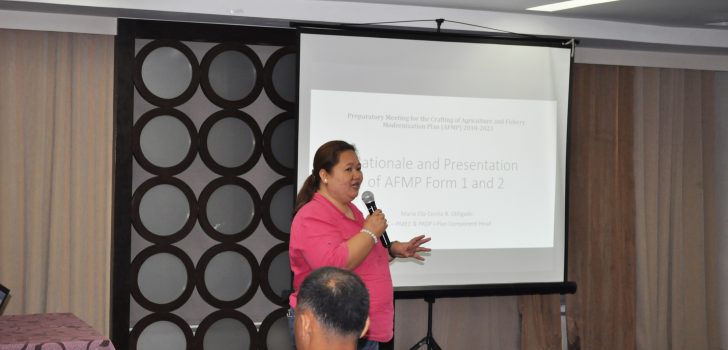 CALABARZON RPCO I-PLAN Component Head Ella Obligado provides the rationale behind the use of the PRDP tools in crafting the new AFMP for the 2018–2023 period. (Photo taken by Management Information Systems, DA CALABARZON)
CALABARZON RPCO I-PLAN Component Head Ella Obligado provides the rationale behind the use of the PRDP tools in crafting the new AFMP for the 2018–2023 period. (Photo taken by Management Information Systems, DA CALABARZON) PRDP helps shape future agri-fishery plan
The country’s next “agricultural and fisheries blueprint” or the 2018–2023 Agriculture and Fishery Modernization Plan (AFMP) will be based on the results of the tools and processes developed by the Philippine Rural Development Project (PRDP).
“One of the aims of the Project is to modernize the bureaucracy of the Department of Agriculture (DA) through efficient processes and scientific tools. Using these in crafting the AFMP ensures that the programs and projects of the department will be in line with what is needed by the stakeholders and the industry,” CALABARZON Regional Project Coordination Office (RPCO) Director Arnel de Mesa said.
The third AFMP to be formulated under Republic Act 8435 or the Agriculture and Fisheries Modernization Act (AFMA) of 1997 will be built from the gains of the AFMP 2001–2004, AFMP 2011–2017, and the good practices developed under the PRDP. The new plan will help transform the agriculture and fisheries sector from a resource-based industry to a technology-driven one.
AFMA
The AFMA mandates the DA to develop a medium-range plan that will empower the agriculture and fisheries sector to attain development and sustainability. This plan will support the goal of the national economy for a more equitable and sustainable distribution of opportunities, income, and wealth.
The AFMP focuses on poverty alleviation and social equity, food security, and people empowerment. It also looks into rational use of resources, global competitiveness, sustainable development, and protection from unfair competition.
Based on the AFMA, the planning process should be participatory in nature and must involve the farmers and fisherfolk, private sector, civic organizations, and the appropriate government offices during the consultation process.
PRDP I-PLAN and the Project tools
The PRDP local and national level planning (I-PLAN) component aims to institutionalize the national and regional AFMPs as the main bases of decision making by the DA at the national, regional, and local levels. Thus, all subsequent plans and budget of the department shall be consistent with the AFMP.
The commodity-specific Value Chain Analysis (VCA) and the Provincial or City Commodity Investment Plans (P/CCIPs) are two of the major outputs of the component that will help shape the AFMP.
In conjunction with the VCA, the PRDP also uses science-based tools such as the Expanded Vulnerability and Sustainability Analysis (E-VSA), Rapid Market Appraisal (RMA), and the Applied Geotagging Tool (AGT).
A more comprehensive version of the VSA developed by the Bureau of Soils and Water Management (BSWM), the E-VSA is a critical planning tool that evaluates the suitability of specific commodities in particular areas. It also evaluates the disaster vulnerability and socio-economic conditions of selected municipalities or provinces.
The RMA, on the other hand, is an iterative and interactive research methodology, which is used to better understand the complex market systems in a short period of time.
Providing geographical data of the influence area of subprojects such as farm-to-market roads, bridges, and irrigation systems, the AGT is used in monitoring subproject progress. The PRDP also uses this tool to promote good governance and transparency in project implementation.
AFMP Orientation
To help the DA CALABARZON come up with its updated regional AFMP, the RPCO I-PLAN component gathered its partner local government units (LGUs) for a capacity building training on the use of the PRDP tools. On October 18–20, the personnel of the agriculture and veterinary offices of the provinces, cities, and municipalities in the region participated in the activity.
“All LGUs in the region have experienced using these tools during the VCA preparation. Now, we want to mainstream it further to ensure that every decision made for the agriculture and fisheries sector will be science-based,” RPCO I-PLAN Component Head Maria Ella Cecilia Obligado said. ### (Lawrence Albert A. Bariring, DA-PRDP CALABARZON RPCO InfoACE Unit)
